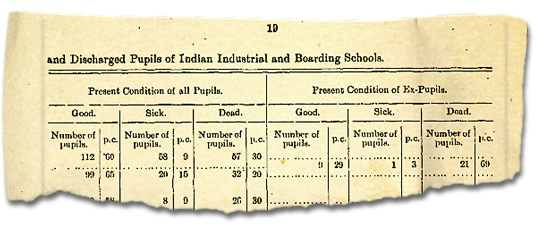I rapidly read Thomas King’s The Inconvenient Indian: A Curious Account of Native People in North America. Most reviews of the book have noted how successfuly King’s narrative (he resists the term “history”) manages to recount so many sad and shameful episodes with well-honed irony and frequent dark one-liners.
Sometimes the punchlines land more like punches. Consider this excerpt on residential schools in North America, where children were removed from their homes and frequently forced to reside:
The schools in both countries were, for the most part, overcrowded. Diseases flourished. Sexual and physical abuse was common. The children received neither proper nutrition nor proper clothing. In 1907, Dr. Peter Bryce submitted a report to Duncan Campbell Scott, the Superintendent of the Department of Indian Affairs, which set the mortality rate for Native students at residential schools in British Columbia at around 30 percent. The rate for Alberta was 50 percent. I’m not sure exactly how Scott reacted to the report, but, in 1910, he dismissed the high death rate at the schools, insisting that “this alone does not justify a change in the policy of this Department, which is geared towards the final solution of our Indian Problem.”
Final solution. An unfortunate choice of words. Of course, no one is suggesting that Adolf Hitler was quoting Scott when Hitler talked about the final solution of the Jewish problem” in 1942. That would be tactless and unseemly. And just so we’re perfectly clear, Scott was advocating assimilation, not extermination. Sometimes people get the two mixed up.
I suppose some things have improved over the past century. Nobody says our current education system is perfect, but we do manage to avoid killing half of our students.
The Bryce report was suppressed by the Canadian government that commissioned it. He published a version on his own when he retired. (PDF – 2.2 MB)
Recent media reports have highlighted a study from the Missing Children Project, putting the death toll in Canadian residential schools at a minimum of 3000. Most killed by disease.
See also: Indian Horse, a fictional account of the cascading human costs of residential school abuse, written by Richard Wagamese. (Incidentally, Wagamese lives on the other side of the lake from our current place.) And Speaking My Truth: Reflections on Reconciliation and Residential Schools, distilled from the Aboriginal Healing Foundation’s three-volume series Truth and Reconciliation, which can be ordered for free (or read online) at http://speakingmytruth.ca/

Thanks for these links, Brian. I’m cooking up an upcoming Talons unit on the prairies (Riel, Northwest Resistance, Treaties & Indian Act), and a few of the above reads could provide further insight into the modern stories of our colonial history.
Have you seen the graphic novel bio of Louis Riel? http://www.amazon.ca/Louis-Riel-A-Comic-Strip-Biography/dp/1894937899 It’s pretty great, as well.
Hope you guys are into the thaw soon!
Yet another amazing Talons experience. I believe I read an interview with Thomas King in which he indicated he wrote the book with its potential use in classrooms in mind. I could see it working fairly well for your unit. His take on the, um, mutable nature of treaties in North American history is particularly apt.
If you want to go multi-media, I understand that King covered some of the same ground in his 2003 Massey lectures. I haven’t listened yet, but intend to soon. http://www.cbc.ca/ideas/massey-archives/2003/11/07/massey-lectures-2003-the-truth-about-stories-a-native-narrative/
The Chester Brown book is wonderful. My ten year old son read it a couple of months ago and it really fired him up.
Very much looking forward to seeing where you go with this!
Well his mom read the 10 year old the Chester Brown aloud…but truly amazing that he wanted to keep going. We read it in one weekend by the fire.
I keep thinking back to Jane Eyre’s first school- Lowood and how it was finally discredited and reformed in the novel. The story stops. Meanwhile in real life Rev. Brocklehurst and his ilk got on a boat and informed generations of assimilation/extermination “educational” policy. The emergence of a more liberated, open educational system depends on this kind of reckoning, grieving for those who died and reconciliation with survivors of the residential school system.
Thanks for the familial responses, team! Will be sure to keep you in the loop as we move ahead,
Bryan
I’m right at the start of The Inconvenient Indian but it’s amazing. More used to Thomas King’s fiction but his deft comic hand and piercing insight are welcome additions to non-fiction’s treatment of First Nations’ sometimes demoralizing realities. Just read Richard VanCamp’s Godless But Loyal to Heaven, which is kinda Tom King’s fiction offspring. Hugely recommend.
“Inconvenient” from @brlamb #indigenous #firstnations #canada http://t.co/F01KapJqLP